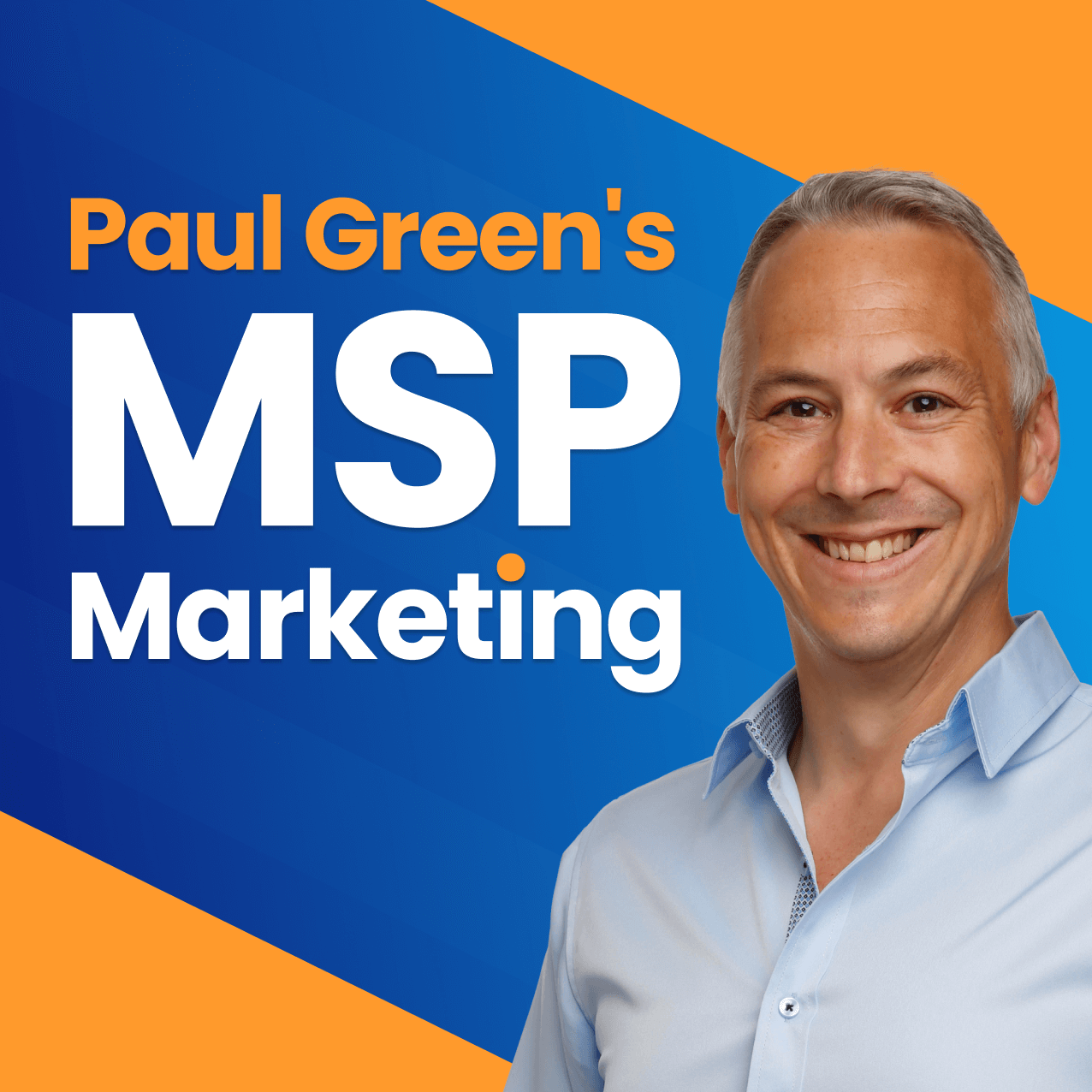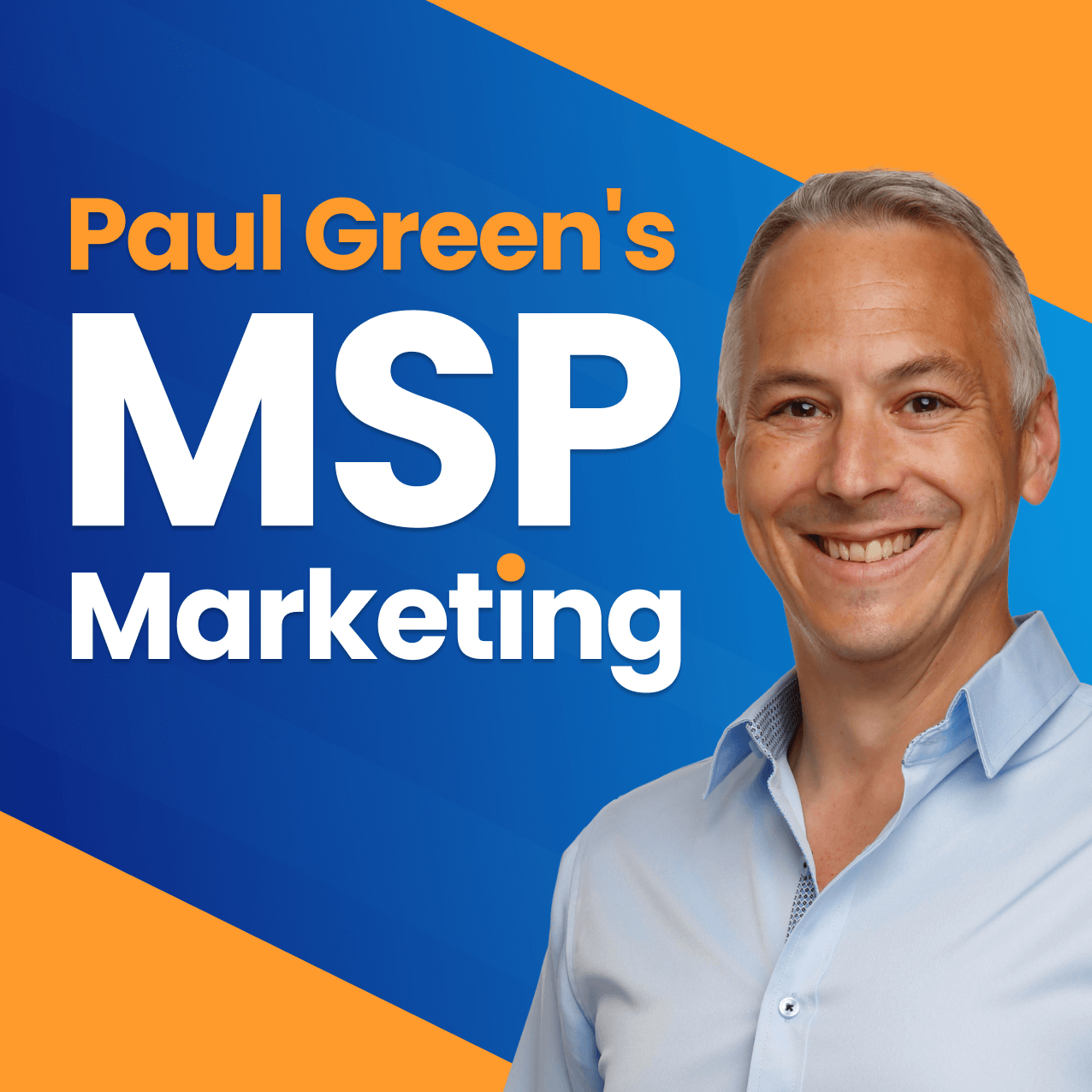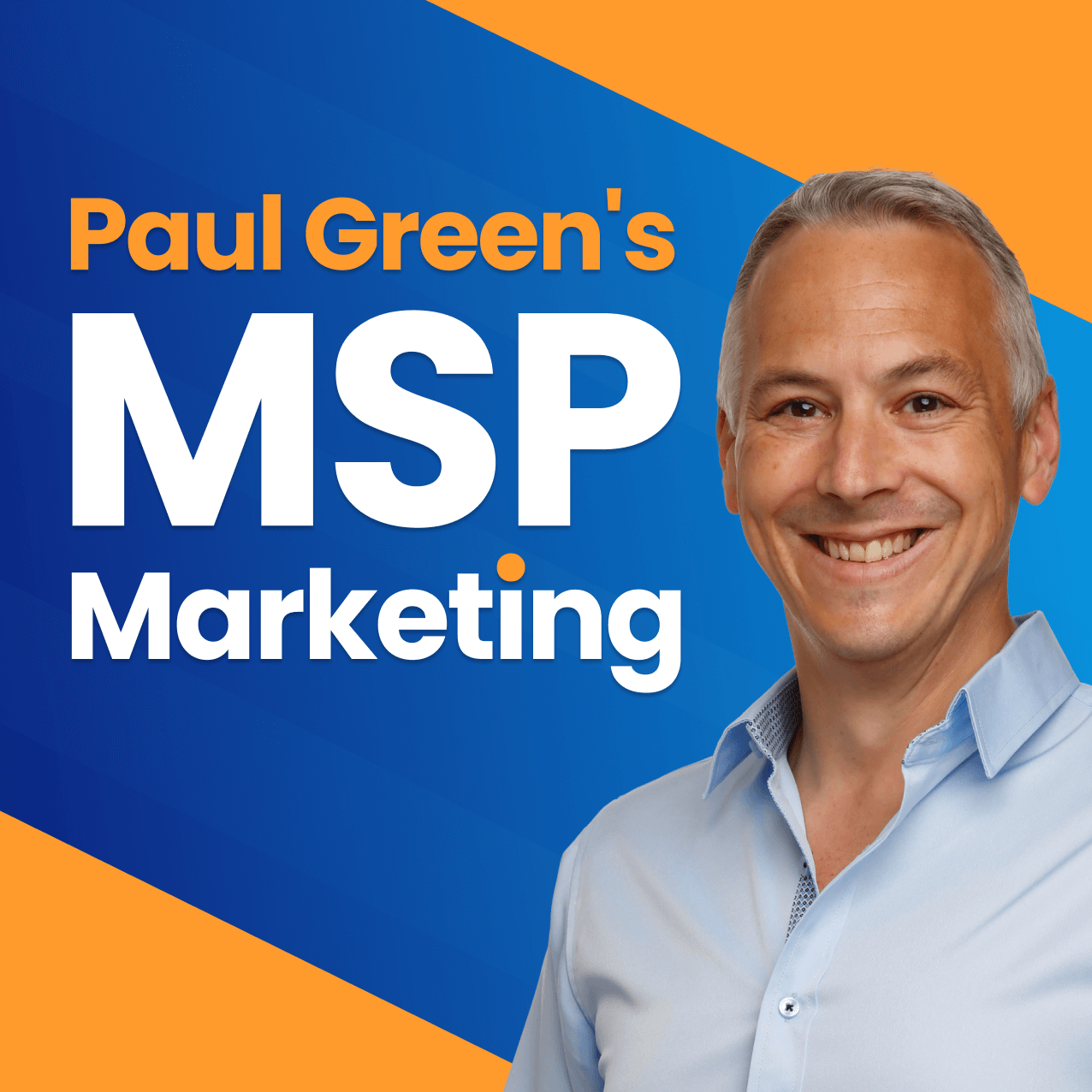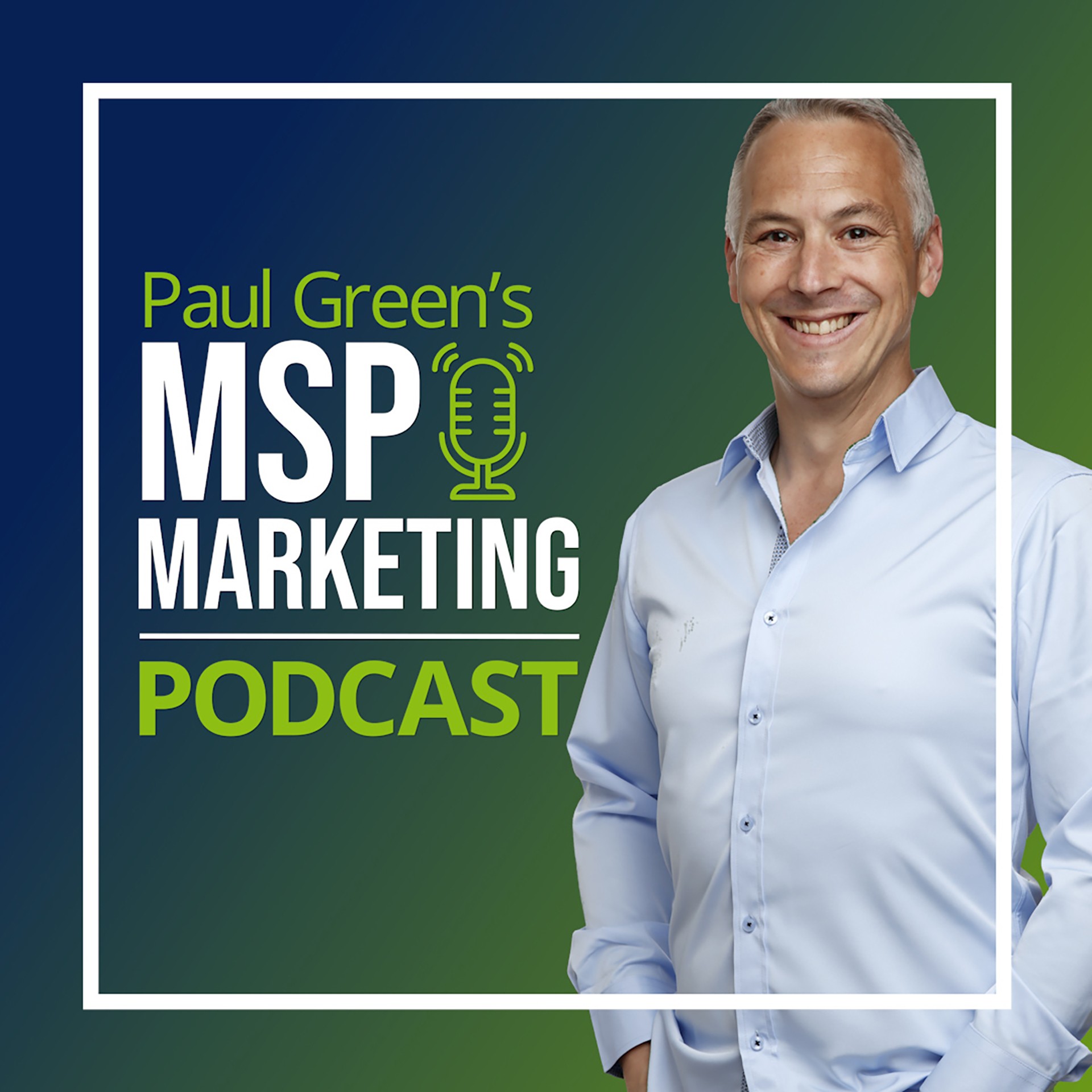Successful MSPs simplify EVERYTHING
Description
The podcast powered by the MSP Marketing Edge
Welcome to Episode 251 of the MSP Marketing Podcast with me, Paul Green. This week…
- Successful MSPs simplify EVERYTHING: Focus on simplifying and removing things you don’t really need to do. This can increase profitability and ease of management while reducing unnecessary complexity.
- The link between what you do each day, and achieving goals: If you have a clear vision for where you want your life to go, you can use that to affect the actions that you take within your MSP every day.
- Why PR is a valid marketing tool for MSPs in 2024: Mickie Kennedy, founder of eReleases, shares insights on how MSPs can effectively generate free publicity through strategic press releases, offering tips on how to capture the attention of journalists and boost credibility and visibility in the media.
- Paul’s Personal Peer Group: Martin, who runs an MSP in Arizona, wants to know the best way to hold a team meeting when you have some staff who are a little disruptive.
Successful MSPs simplify EVERYTHING
The business that you chose to be in, Managed Services, is already one of the most complex kinds of businesses on the planet. Just stop and think about everything that you have to support – all the different clients, the different setups, the different technologies. And yet I see loads of MSPs making their lives even harder by overcomplicating things in their business that could and should be simple. So let’s talk about how you can make your business easier to run and more profitable by simplifying everything.
I’m on a bit of a simplification mission right now. We’ve had some fairly major development projects in our business over the last 12 months, and while I was focusing on those and constantly reducing complication within those projects and just making everything simpler, I realised we could do this across the business. Because we’ve been going for eight years and what happens is when you’ve been going that long, you kind of hold onto legacy stuff. Things that we’re just doing because, or something that worked really well six years ago but there’s now a better way of doing it. And for me, it’s a really exciting thing to just go through the business like a tornado and just simplify everything. So I’ve given myself a new job title. I am Head of Simplification, and I’m using this as an opportunity to review everything we do in the business asking this big question, how can we make this simpler? Because that’s actually a very powerful question to ask. Is this a question you ask yourself in your MSP regularly?
Just because you can handle high levels of complication doesn’t mean that you should put up with high levels of complication.
In fact, I truly believe that the simpler business is, the more fun it is to run and the more profitable it can be. And I guess there are two main places where you can simplify your business. The first is your operations and what you do now. At the risk of starting you down the road of looking at your tech stack, because I’m always hesitant to suggest an MSP reviews their tech stack in case it becomes a bad case of tech stack fiddling where you’re attracted to the shiny thing. Maybe you should just be asking yourself, does my PSA allow me to run the business as simply as possible? Is my RMM easy to use but also powerful enough to do all the things we need it to do? Look at your standard operating procedures, these are the manuals for how you run your business. So what kind of business are they encouraging you to run in their complexity? Now, I’m sure you are all over automation, which surely must be the ultimate way of simplifying something because you are removing the humans from it.
But other suggestions include removing steps where you can, asking yourself why something is done and whether it’s just for heritage reasons, like I was saying earlier, rather than because it’s useful today. And I think the most useful thing to do is to talk to your team; the people who are actually running these processes, who are following your standard operating procedures, and ask them what needs to be simplified. Ask them what is surplus to requirements, what job do they hate doing every single week? And then focus your attention on reducing or removing those jobs.
So the first main place where you can simplify everything is operations, but what’s the second main place? Well, surely that’s the clients, and by that I mean can you simplify their technology setups? Now, I appreciate your immediate knee jerk reaction to this might be, no, I can’t Paul, and you are mad, but hear me out because I’ve worked with a few MSPs over the years who insist on a standard setup for a client. When a new client joins them, they must migrate all of their technology to the MSP’s preferred way doing things. For example, that might be having a standard router in every single client. Now the exact same router made by the exact same manufacturer in every single client. Can you see the huge benefits of that as a business? You and your technicians become utter experts on that specific type of router. If you pick up an error with one of the routers that you’re looking after, then you can proactively go and prevent that error or check for that error in other client’s bases, which is great. And as you know, I’m not a tech person, but this has always made sense to me as a way of reducing down the complications within an MSP.
I appreciate it probably reduces your options a little bit in the sense that if a client won’t change their technology, they’re never going to switch over to you. But I suspect that’s more than made up for in the increase in profit and customer service from having a single type of technology to support. Tell me, is this something you do in your MSP? If you could wave a magic wand and simplify anything tomorrow, what would that be?
The link between what you do each day, and achieving goals
Let me tell you how your vision for how you want your life to be directly affects the goals that you set for your MSP. Which directly affects the strategies that you choose. Which directly affects the tactics that you choose to deliver those strategies. Which of course directly influences what you actually do on a day-to-day basis.
Let’s start at the very top of that again. So everyone has a vision for their future life, whether they’ve written it down or not. I write mine down and I read it every morning, but I know that I’m the minority in this. If you do have a vision for your life, by the way, write it down. For most people, this vision for a future life involves spending more time doing the things they love outside of work with the people that they love. That’s probably your other half, your kids, your family. And of course the vision often is about generating more cash to make it easier to do those things or to allow you to buy back your time.
Now, some people turn that vision into hard smart goals for the business. SMART is an acronym. It stands for specific, measurable, achievable, relevant,and time bound. And you can use those smart goals to define the correct strategy for growth. Once you’ve got a clear strategy, the specific tactics actually become crystal clear. And the question of, let’s say for example, should I use LinkedIn, which is a common question I get from MSPs, that becomes really easy to answer when you understand the goal that the business is working towards and the strategy that’s been set to deliver that goal. The choice of tactics then leads on to your daily activities.
And this is the thing I really want to talk about the things you do every day. Because I want to help you make a mental connection here. Your ability to change your life in the future – which by the way, anybody in any situation can do – is directly affected by what you do in your business, in your life every single day. Let’s take a non MSP example.
If you want to be a muscle ripped Adonis, then you expect to have to lift weights every day and eat protein and all of that stuff, right? It’s no different within your business.
If you want an MSP that onboards a new client every month, at least every month, then you need to build a marketing machine. And just like getting ripped, that’s an ongoing process with tiny actions every day that really add up over time. You wouldn’t expect to turn into Adonis just by going to the gym once.
So how do you expect to onboard a new client every month just doing a piece of marketing once. You’ve got to build a marketing machine and then every day you need to do something within that marketing machine that either wins you more new clients, get those clients to buy from you more often, or get those clients to choose to spend more. That’s how you connect your daily activities to the amazing future life that you’re going to have.
Why PR is a valid marketing tool for MSPs in 2024
Featured guest: Mickie Kennedy, founded eReleases 25 years ago to help small businesses, authors, and startups increase their visibility and credibility through tier-1 press release distribution.
Mickie lives in Baltimore and has created a free video Master Class on how to create a winning PR strategy, based on the PR campaigns of his most successful clients.
Maybe you’ve seen a competitor featured in a local newspaper, radio station or TV station and you’ve wondered, Hey, how do I get my MSP free publicity like that? Well, my guest today is at the very heart of generating PR results, public relations free publi










